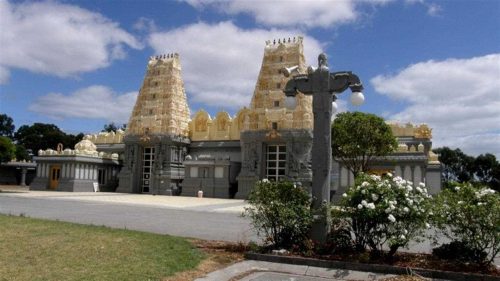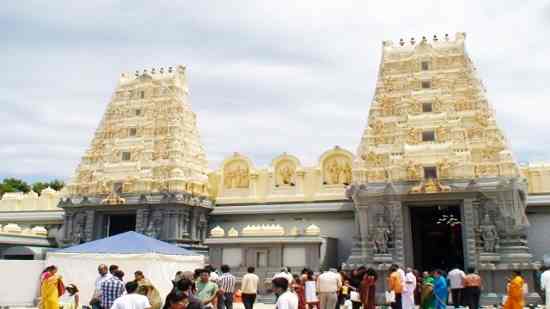Hindu Society of Victoria – HSV has been fighting a Compliance Notice issued to it by a Fair Work Commission inspector in the Federal Circuit Court since 2014.
On 19 November 2014, the Fair Work Commission had issued a Compliance Notice alleging various contraventions by the HSV and required the HSV to make a payment of $77,754.76 to an employee called Mr S. Narayanan (“SN”) it had sponsored from India. As per the Notice, it was a result of alleged underpayments to that employee.
SN had been sponsored as ‘assistant priest’ but was allegedly continuously used as a cook in the temple canteen.
By the 2012/13 financial year, the catering income being generated by the Applicant was in excess of $680,000. However, this represented a relatively small proportion of the Applicant’s overall revenue stream which totalled in excess of $2.5 million for the year.
BT believes that SN while working in the kitchen injured his hand and it was this accident which led him (or on his behalf) to contact the authorities – which culminated in the action by the Fair Work Commission.
This not only activated the Fair Work Commission, but also triggered the Immigration department who decided to look into the sponsorships the HSV had undertaken in relation to its employees.
BT believes the HSV was seen by the Fair Work Commission as having committed contraventions in relation to the Australian Award System (Wages) which in turn open the can of worms – Australian Immigration and sponsorships and various definitions used by the HSV to characterise its sponsored employees.
For a layman, SN was allegedly sponsored as Assistant Priest but brought to be used as a cook. Thus, for the courts, his immigration status in Australia was as a religious worker – when he was working as a cook. And if he was working as a cook, – was he being paid the right wage for his job?
The Fair Work inspector thought he was not and issued a notice after detailed investigation.
The HSV chose to take Fair Work Commission to court seeking an order that the alleged breaches or contraventions mentioned in the Compliance Notice had not been committed.
For those legally minded readers, challenging Notice, the HSV’s lawyers pleaded that the duty to prove the alleged contraventions rested with the Fair Work Commission.
The court rejected that argument and ordered that the HSV bore the responsibility to disprove the contraventions alleged by the Compliance Notice.
Then the committee’s lawyers pleaded with the court that SN was working as a religious worker only – and cooking ‘prasadam’ in the canteen was part of his duties as assistant priest.
The HSV lawyers relied on two documents – the Letter of Appointment dated January 2011 and the Contract dated 17 June 2011.
The Contract listed the following duties:
SPECIFIC DUTIES
1) To assist all priests in their duties which are currently performed in the temple to the scheduled time limits.
2) Wash and iron all fabrics used for decorating deities.
3) Prepare Naivethiam (special food offerings to deities) and prasadam.
4) Make fresh flower garlands daily for deities.
5) Clean and maintain all brass and silverware used in rituals.
6) Maintain and clean all shrines in accordance with Indian Architectural traditions.
7) Maintenance and cleaning of the temple kitchen and utensils.
The Letter of Appointment listed:
SPECIFIC DUTIES
1, To share all duties, which are currently performed by the priests of the temple by arrangements with them and the managers.
2, To attend to the “yagasalai” and “kumba” arrangements for various poojas.
3, To decorate the deities (saathupadi) for all kind of utaavas.
4, To prepare “naiveithiam” and “prasadam” for the temple requirements.
5, To conduct and / or participate in pooja functions and to ensure they are conducted strictly according to the time limits and schedule.
6, To prioritise and for see the requirements for the forthcoming events and make necessary arrangement in conjunction with the other Priests and the Manager.
7, To be responsible for cleaning and maintenance of the deities and sanctum sanctorum ( all Moolasthanam ) and all oher property belonging to the temple and used in the pooja and ceremonies.
8, To make garlands for deities.
9, To account all monies, other items and property received for and on behalf of the temple.
10, To perform any other duties as and when directed by the manager or his assistant.
11, To attend, participate and conduct religious and cultural functions and promote Hinduism and Hindu culture at the temple.
The HSV’s nomination made to the Department of Immigration for the visa for Mr SN described the benefit to the nominating agency (the Applicant) as follows:
Religious (Hindu) workers are very difficult to locate within Australia, and is in short supply. Maintenance of the temple provides employment for other related workers, expansion of the business of the temple contributing to the overall economy even by tourism to the temple.
In further documentation by the HSV to the Department, there was a list of employees at the Temple which provided the four categories of positions: priests, assistant priest, supporting assistant to priest, and managers.
“There was no mention in the material of a chef or cook”, the Judge said.
The Judge noted the HSV in its own documents to the Immigration had set out the following duties and responsibilities:
The Assistant Priest has the following duties and responsibilities:
Performing daily poojas including Abishekams, Sahastra Namarchanas, and Homas;
Assisting the priest in performing Brahmothsavas including Angurarpana poojah, Thwajarohanam (flag hoisting), Rathotsavam, Yaga Sala rituals (fire ceremony), and Theerthotsavam (water cutting ceremony);
Preparing a variety of prasadam (food such as coconut rice, lemon rice, sweets, Lattu, Panchamirdam, Modakam, Vadai etc;
Washing and ironing all Vasthiram (fabric) used for deitie;
Making garlands from fresh flowers for deities;
Clean and maintain all brasswares/silverware and utensils used for poojas;
Periodic cleaning of granite and Panchaloka Vigrahas, and the shrines to meet necessary hygienic standards;
Keep temple kitchen tidy, clean and maintain it to a level which meets the Australian standards;
Open temple everyday for the public.
He further noted the core skills required for the position were stipulated as:
The skills required for this position include:
Capacity to work under pressure with minimum supervision;
Ability to work as a member of a team;
Prioritising work load and organising team activities;
Excellent oral communication to understand the requirements of the congregation.
Now the question was – was SN cooking only ‘“naiveithiam” and “prasadam for the deities’? If yes, where?
BT believes the food for deities is prepared in a separate kitchen called ‘Madapalli’. And SN told the court he never worked in Madapalli and attended Madapalli only on his days off work – to be with his nephew Vasu. This is what he told the court/Fair Work Commission:
I was never asked or directed to work in the Madapalli at the Hindu Society. The only times I went in the Madapalli was on my days off. On my days off, I would go to the temple to pray and then visit my nephew, Vasu, in the Madapalli. Vasu worked there as a Madapalli priest. As I enjoyed the work and enjoyed spending time with Vasu, I would help him out in the Madapalli. However, I never made Prasadam while I was employed at the Hindu Society.

The judge noted the Annual Report 2012/2013 of the HSV which had references to HSV canteen reading:
An experienced chef and an additional cook have been recruited to the canteen. With this additional resource the canteen now caters a variety of dishes. Additional space has been provided for dining in. Take away and external catering for functions too are becoming popular. As in the past several volunteers help to sell and serve food as well and help in large scale cooking and cleaning.
“I am satisfied on the material that the reference to “additional cook” is a reference to Mr SN”, the Judge said.
Further, the court noted Ms Brodie Smith, the Fair Work Commission inspector took the view that the HSV was a ‘trading entity’ as a result of looking at the financial records, undertaking a search of the HSV.
The Notice Ms Smith issued incorporated the following:
During the Contravention Period, a substantial character of the Employer’s enterprise included the operation of a restaurant function within the meaning of the Restaurant Award.
The judge noted Mr Pendyala, the then president of the HSV had provided the clock cards to the inspector on which the calculations of the wages owing to Mr SN were made.
“In his (Mr Pendyala’s) view, Mr SN was not a Madapalli priest;
…
Ultimately, I am persuaded that the Applicant (the HSV) is within the “restaurant industry”, at least to the extent of the operation of its canteen in the Cultural Centre, the Judge noted.
And he took the view that the allegations of alleged underpayment of $77,754.76 by the HSV to SN stand.
The court, being kind to the HSV, did not make any orders asking the HSV to pay other side’s legal costs which could have run into hundreds of thousands of dollars.
BT has learnt from unconfirmed sources that the HSV committee has decided not to appeal the decision of Judge Riethmuller. That in essence means that Mr SN is now entitled to be paid $77,754.76 by the HSV.
In addition to paying Mr SN, HSV has incurred substantial legal costs for its lawyers, which some say, would be of the size of the amount, it was attempting to not pay.
BT contacted Vasan Srinivasan and Yogen Lakshman for comment. Both declined.
BT also made attempts to contact Mr Hari Guduru, current president of the HSV for comment – sent him questions via email but did not hear back from him until publishing or going to print.
– DM
Similar Posts by The Author:
- Problems of Arvind Kejriwal lie in the Charge-sheet against Manish Sisodia
- ABC Ram Temple coverage: ABC Ombudsman’s “No Bias” report – a slap on the face of Australian Hindus
- Defamation dogfights are dogging the leader: Should John Pesutto step down to come back later?
- ASIO boss Mike Burgess MUST name the rogue politician, academics
- Who can stop John Pesutto from becoming Premier of Victoria?

